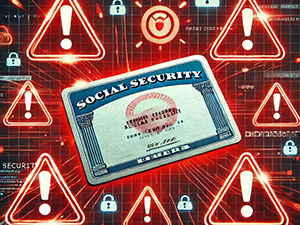
By now, most people’s Social Security numbers (SSNs)—one of the most critical pieces of personal information—have likely found their way onto the dark web. With breaches from major companies, government organizations, and even healthcare providers, millions of SSNs are circulating among cybercriminals.
Is this a big deal? Spoiler alert: yes, it is. Here’s why a leaked SSN matters, how to check if yours has been compromised, and what to do if it has.
Why Is a Leaked Social Security Number Such a Big Deal?
Your Social Security number is a key part of your identity. With just your SSN, hackers can unlock sensitive personal and financial information, impersonate you, take out loans, or access important accounts. Even if you don’t see immediate effects, criminals can hold onto your SSN for years before exploiting it.
For businesses, protecting sensitive information such as Social Security numbers is critical to avoid costly breaches. Learn more about how Managed IT Services can safeguard your data and keep your systems secure.
What Can Happen if Your SSN Is Stolen?
A compromised SSN can lead to:
- Identity Theft: Fraudsters can open credit accounts, file false tax returns, or take out loans in your name.
- Employment Fraud: Stolen SSNs can be used to secure jobs, leading to unexpected tax issues.
- Medical Fraud: Criminals may use stolen SSNs to access healthcare, leaving you with false medical records or unpaid bills.
To protect yourself and your business from identity theft, consider scheduling a Risk Assessment to evaluate potential vulnerabilities and safeguard sensitive data.
Signs Your SSN Has Been Stolen
Look out for these warning signs:
- Unexpected Mail: Credit card offers, debt collection notices, or bills for accounts you didn’t open.
- Credit Report Surprises: Accounts or inquiries you don’t recognize.
- Tax Issues: IRS notifications of multiple tax returns filed in your name.
- Unfamiliar Medical Bills: Unexpected charges or discrepancies in your medical records.
If you notice any of these signs, act quickly to minimize the damage. Don’t forget to sign up for our Cybersecurity Tip of the Week to stay informed about emerging threats and proactive solutions.
How to Check if Your SSN Was Leaked—and Protect Yourself
Monitor Your Credit Report
Check your credit report regularly for unfamiliar activity. You’re entitled to one free report annually from each of the three major credit bureaus: Experian, TransUnion, and Equifax.
Use an Identity Theft Protection Service
Services like Experian IdentityWorks or LifeLock monitor your SSN and notify you of suspicious activity.
Freeze Your Credit
A credit freeze restricts access to your credit report, making it harder for criminals to open accounts in your name. You can do this for free through all three credit bureaus.
Sign Up for SSN Alerts
The Social Security Administration offers alerts for specific activities on your account. While not comprehensive, it adds an extra layer of protection.
Protecting your SSN is part of a larger cybersecurity strategy. Consider booking a Discovery Call with our team to discuss ways to secure your data and reduce vulnerabilities.
What to Do Immediately if Your SSN Is Leaked
If you confirm your SSN is compromised:
- File a Report with the FTC: Use IdentityTheft.gov to report the theft and create a recovery plan.
- Contact the Credit Bureaus: Place a fraud alert on your credit report.
- Freeze Your Credit: Prevent new accounts from being opened.
- File a Police Report: If financial loss or criminal activity occurs, file a report for documentation.
- Notify Financial Institutions: Alert your bank and other institutions to monitor your accounts for suspicious activity.
Protecting Your Business
For businesses, safeguarding Social Security numbers and personal data is critical. A single breach can lead to identity theft for employees and clients, unauthorized financial access, and reputational damage. Strong cybersecurity measures, including data encryption, employee education, and Network Security, can help prevent breaches.
Conclusion
A leaked Social Security number is a serious issue that can have long-lasting effects. Whether you’re an individual protecting your identity or a business safeguarding sensitive information, proactive measures are essential. Monitor your credit, freeze your accounts, and take steps to secure your data.
For more tips and insights, sign up for our Cybersecurity Tip of the Week and stay ahead of evolving cyber threats.



